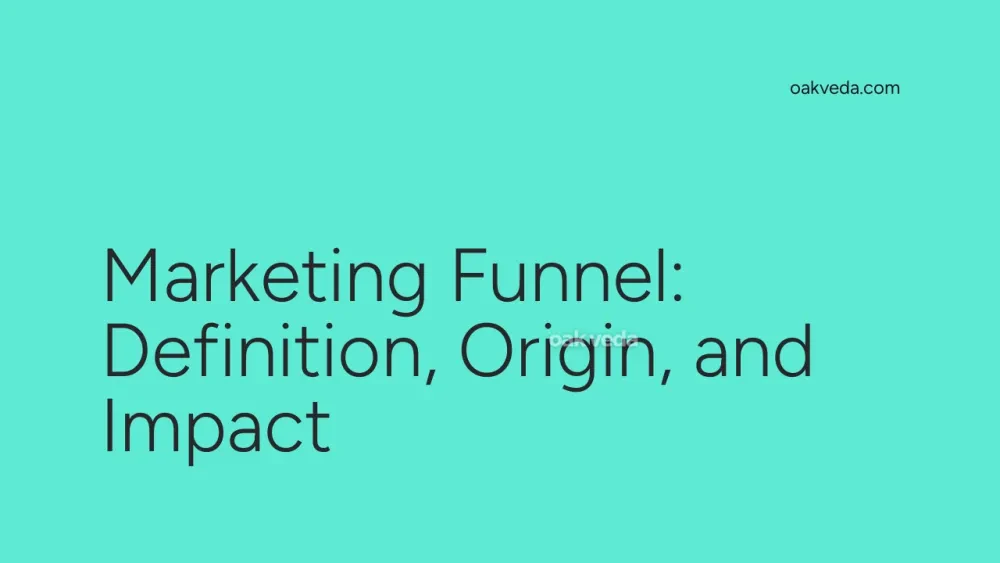
What is a Marketing Funnel?
A marketing funnel is a conceptual model that illustrates the customer journey from initial awareness of a product or service to the final purchase decision. This framework helps marketers understand and optimize the various stages a potential customer goes through before making a purchase. The funnel metaphor is used because, typically, a large number of potential customers enter the top of the funnel, but only a fraction of them complete the journey to become paying customers.
Origin and Development of the Marketing Funnel
The concept of the marketing funnel has its roots in the late 19th century. In 1898, E. St. Elmo Lewis developed the AIDA model (Attention, Interest, Desire, Action), which is considered the precursor to the modern marketing funnel. Over time, this model has evolved to incorporate new insights from consumer behavior studies and advancements in marketing technology.
How the Marketing Funnel Works
The marketing funnel typically consists of several stages:
- Awareness: At this stage, potential customers become aware of a brand, product, or service.
- Interest: Prospects show interest and begin to engage with the brand.
- Consideration: Potential customers evaluate the offering against alternatives.
- Intent: The prospect demonstrates a clear intention to purchase.
- Evaluation: Final assessment before making a decision.
- Purchase: The customer makes the purchase.
- Loyalty: Post-purchase stage where customers become repeat buyers and brand advocates.
Marketers tailor their strategies and messaging for each stage to guide prospects through the funnel effectively.
Types or Variations of Marketing Funnels
While the basic concept remains the same, there are several variations of the marketing funnel:
- TOFU, MOFU, BOFU: Top of Funnel, Middle of Funnel, Bottom of Funnel
- AIDA: Attention, Interest, Desire, Action
- Flywheel Model: A circular approach focusing on customer retention and advocacy
- Hourglass Funnel: Emphasizes post-purchase stages like adoption and advocacy
Popular Examples of Marketing Funnel Implementation
Many successful companies have effectively implemented marketing funnel strategies:
- HubSpot: Known for its inbound marketing approach, HubSpot uses content marketing to guide prospects through each stage of the funnel.
- Amazon: Utilizes personalized recommendations and customer reviews to move customers through the funnel.
- Netflix: Employs a freemium model with a free trial to guide users from awareness to subscription.
Impact of the Marketing Funnel on Digital Marketing Culture
The marketing funnel has significantly influenced digital marketing strategies:
- Content Mapping: Creating targeted content for each funnel stage
- Lead Nurturing: Developing relationships with prospects at every stage
- Marketing Automation: Using technology to guide prospects through the funnel
- Analytics and Optimization: Measuring and improving funnel performance
Controversies or Debates Surrounding the Marketing Funnel
While widely adopted, the marketing funnel concept has faced some criticism:
- Linearity: Some argue that the customer journey is not always linear
- Oversimplification: Critics suggest it doesn't account for the complexity of modern buying behaviors
- Focus on Acquisition: Traditional funnels may neglect customer retention and advocacy
How Brands and Influencers Use the Marketing Funnel
Brands and influencers leverage the marketing funnel in various ways:
- Social Media Marketing: Creating awareness and interest through engaging content
- Email Marketing: Nurturing leads through personalized email campaigns
- Influencer Partnerships: Collaborating with influencers to reach new audiences and build trust
- Retargeting: Re-engaging prospects who have shown interest but haven't converted
Future Trends Related to the Marketing Funnel
The marketing funnel continues to evolve with emerging trends:
- AI and Machine Learning: Predictive analytics to optimize funnel stages
- Personalization: Hyper-targeted content and experiences for individual prospects
- Omnichannel Marketing: Seamless experiences across multiple touchpoints
- Account-Based Marketing (ABM): Tailoring funnels for high-value accounts
- Customer-Centric Models: Shifting focus from linear funnels to cyclical customer journeys
FAQs about the Marketing Funnel
-
Why is the marketing funnel important? The marketing funnel helps businesses understand the customer journey, optimize marketing efforts, and improve conversion rates.
-
How can I measure the effectiveness of my marketing funnel? Key metrics include conversion rates between stages, customer acquisition cost, and lifetime value.
-
Is the marketing funnel still relevant in today's digital landscape? While evolving, the core principles of the marketing funnel remain relevant for understanding and optimizing the customer journey.
-
How often should I review and update my marketing funnel strategy? Regular reviews (quarterly or bi-annually) are recommended to ensure alignment with changing customer behaviors and market trends.
-
Can the marketing funnel be applied to B2B marketing? Yes, the funnel concept is applicable to B2B marketing, though the stages and strategies may differ from B2C approaches.
In conclusion, the marketing funnel remains a fundamental framework in digital marketing, providing valuable insights into the customer journey. As consumer behaviors evolve and new technologies emerge, marketers must adapt their funnel strategies to stay effective in an ever-changing digital landscape.
You may be interested in:
- Clapback: Definition, Origin, and Impact on Social Media
- Old Money Aesthetic: Definition, Origin, and Impact
- Clickbait: Definition, Origin, and Impact on Social Media
- "I Was Today Years Old": Definition, Origin, and Impact
- Sksksk: Definition, Origin, and Impact on Social Media
- Stock Photos: Definition, Origin, and Impact on Social Media

